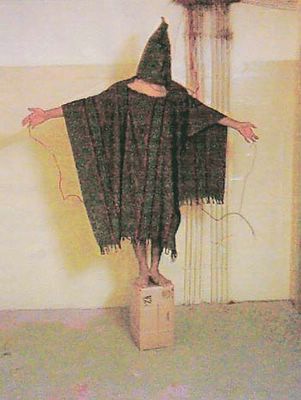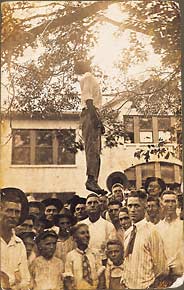[Even after posting this, I have re-edited it a number of times, most lately the evening of June 3rd. Why? I just can't stop thinking about it, I suppose.]How disappointing, Mr. Colson. I'm talking about your comments that Mark Felt, the man newly-revealed as the Watergate scandal's "Deep Throat," betrayed his duty by doing what he did. "I'm shocked," you proclaimed. Well, be aware that many Christians and non-christians are shocked at your response. This was your chance to respond one last, potentially defining, time to the tragedy of Watergate. Instead we got the loyal Colson of old. "Skulking around in dark alleys," is what you labeled Felt's behavior when talking to the media about his disclosure.
Your
prepared statement makes clear why you believe Mark Felt was wrong:
I am disappointed in Mark for choosing the media as the way to expose the corruption. If he felt that the wrongs of the Nixon administration had to be remedied, he should have walked into the F.B.I. Director’s office and told him so, and if necessary walked in to the president.
That is just amazingly naive.
How realistic is the idea that Felt could have just gone to then-F. B. I. Director Patrick Gray, his superior, to bring an end to the criminal activities of the Nixon administration? Gray was in fact someone Felt apparently trusted until it came out that Gray had thrown key documents linked to the Watergate breakins into the Potomac River. And you want us to believe that this man would have listened to reason?
And what of going to the President? The crazy attempts by Nixon and his staff -- including you, Mr. Colson -- to control the metanarrative never stopped. For instance, there is the fact that you, under Mr. Nixon's direction, tried to use Felt to pass on misinformation regarding the attempted assassination of Alabama Gov. George Wallace, blaming the shooting on a liberal plot. Your own words, along with the President's, from the
Nixon tapes:
Nixon can be heard on one tape whispering the rumors in the background as his adviser Chuck Colson, on the phone with the FBI's Mark Felt, passes on that [attempted assassin Arthur] Bremer and his associates might be "Kennedy friends."
"I'll be sure and pass that along," Felt says.
Obviously, a man exposed to that sort of political misdealing -- I'm talking about Felt, not you here, Mr. Colson -- might well think the only thing to be done is to expose the whole obviously paranoid, power-mad mess through the media. Felt obviously believed that the only way to battle Nixon was to get the information to the fourth estate, a conclusion most observers would call correct.
Was Felt himself being paranoid? Again, you be the judge. Consider this bit from a book review of Abuse of Power: the New Nixon Tapes:
As the paranoia thickens and intrigues abound, a lyrical madness seems to seize the Nixon inner circle, feeding first on imagined and then, after the defection of John Dean, Howard Hunt and others, real betrayal. Enemies are everywhere. The entire personnel of the CIA and the FBI are suspect. At one point, Nixon threatens, "I'll fire the whole Goddamn Bureau." He is particularly after one Mark Felt, who is in a top position at the FBI and is thought to be Nixon's nemesis and the source of unflattering leaks. "Is he a Catholic?" Nixon asks Haldeman, who replies that Felt is Jewish. "Christ, put a Jew in there?" Nixon exclaims, and Haldeman adds, "Well, that could explain it, too." [Italics added by bluechristian]
Jews, Arabs, "Any ol' scapegoat'll do."
Mr. Colson, your book Born Again is still one my favorite biographies. I just wish I felt like you still were the broken, humbled man I so loved there. One very big reason I felt that way was because it seemed you'd grasped your own seduction by the distorted madness power creates, and had repented of it. You seemed, indeed, a cleansed new-born man.
Unfortunately, the Charles Colson of today often seems more like that old Colson than the sparkling self-denying Colson who wept in contrition and gladness as he met Jesus Christ. I read and heard (via WMBI) your comments last week about the protest by one third of Calvin College's faculty and students regarding President Bush's visit there. Your comments then echo eeriely of your comments today: the protesters, like Felt, didn't pursue their objective using the conduits of good manners.
Again, your prepared statement on Mark Felt seems incredible to me:
No matter how Felt may justify his actions, it is not honorable to leak classified information to the press. Governments cannot function if the chief executive cannot trust people who hold sensitive positions, and there are few positions more sensitive than the deputy director of the FBI. A president has to be able [to] deal with someone in a sensitive position without worrying that his conversations are going to be disclosed to the press.
Do you really think merely by saying "he's wrong!" and "he's not honorable!" that you somehow win the argument or convince anyone not already convinced? By what authority do you speak? I don't find your words on Watergate authoritative; in fact, quite the opposite. By the same lights, I find Mark Felt's words authoritative; they match what was, and they come from a man who risked at least his professional life by disclosing what he did. This is harsh to ask, Mr. Colson. But what did you risk?
This oddly unconvincing authoritarian tone has increasingly become habitual with you, it seems to me. You found "Deep Throat" and the anti-Bush Calvin contingent untidy, yet in the face of power resistance is always untidy. Look what happened to Jesus. So unmannered! Regarding those Calvin rebels, you left out the very thing that is the mainspring of their (and my) objections to using Bush as an example of our faith. The war, Mr. Colson. The unjust, lied-about, pre-planned cover-up leading to a falsely engaged in war. The Watergate of our time, one leading to thousands of deaths. This, too, is a pro-life issue.
Who is the real audience for your words, Mr. Colson? This is what really breaks my heart. Your words are for evangelicals. I have historically counted myself an evangelical, but continually find myself an orphan instead. The reasons for this are so multifaceted, I literally find myself speechless (though often not tearless) over the terrible place to which many evangelical Christians -- especially evangelical leaders -- seem to have fallen. We are seduced by nationalism, keepers of a non-existent romantic ideal mixing religiousity and American triumphalism, an ideal that has nothing to do with Jesus. And we, just like Marx once accused, do use our faith as an opiate rather than a stimulant toward change and repentance. Your words, Mr. Colson, are not in accord with reality.
Consider the words of Catholic theologian / philosopher Josef Pieper, writing in his tiny but pithy
Abuse of Language, Abuse of Power. This quote is long, but makes the point at hand:
[T]he abuse of political power is fundamentally connected with the sophistic abuse of the word, indeed, finds in it the fertile soil in which to hide and grow and get ready, so much so that the latent potential of the the totalitarian poison can be ascertained, as it were, by observing the symptom of the public abuse of language. The degradation, too, of man through man, alarmingly evident in the acts of physical violence committed by all tyrannies (concentration camps, torture), has its beginning, certainly much less alarmingly, at that almost imperceptible moment when the word loses its dignity...
For the general public is being reduced to a state where people not only are unable to find out about the truth but also become unable even to search for the truth because they are satisfied with deception and trickery that have determined their convictions, satisfied with a fictitious reality created by design through the abuse of language. (Italics in original)
You seem to see yourself as a guard of the center -- that is, American nationalism -- much as you saw yourself back then. It seems you've merely added Christianity to this center (if such a thing were in fact possible!). Many of us feel that nationalism -- no matter how noble-seeming the nation in question -- is antithetical to Christianity. You seem to want to elevate that center, but many of your fellow Christians, not to mention your fellow Americans, are not interested in such a project.
What center then can we find? There is only the commonality of human suffering, a Savior who shares in it, and his command to us to partake in his sufferings, be his disciples, and to spread his Words and Life.
I met Jesus within the same year you did, Mr. Colson. I pray to God we both hang on to that first love. And love, as I might imagine you saying in some other context, isn't love without truth. Truth, as Jesus once said, will be cried out by the stones if the people are silent.
Please don't forget how dangerous power is.







